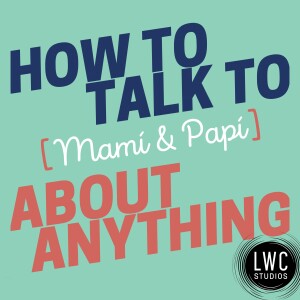![How to Talk to [Mamí & Papí] about Anything](https://pbcdn1.podbean.com/imglogo/dir-logo/859810/859810_300x300.jpg)
How to Talk to [Mamí & Papí] about Anything
Society & Culture:Relationships

When Estela gets diagnosed with bilateral breast cancer she opens up about her health and body to her adult children in ways her Mexican mother never did with her. And Laura Fejerman, a researcher studying hereditary breast cancer among Latinas, speaks with Juleyka about how to talk with older relatives about their health histories and private parts without making them uncomfortable.
Estela Casas is the author of the book A Place to Anchor: Journalism, Cancer, and Rewriting Mi Vida as a Latina on the Border.
Featured Expert:
Dr. Laura Fejerman's research focuses on the discovery and understanding of genetic and environmental factors that contribute to breast cancer risk and survival and that could be used as targets for prevention and therapy, with special interest in self-identifying Hispanic/Latina women in the US and in Latin America. Additionally, Dr. Fejerman contributes to the elimination of cancer health disparities by developing and implementing programs for cancer education, screening, and navigation in underserved communities in California. Learn more about her work community engagement work and research at the UC Davis Comprehensive Cancer Center and at The Fejerman Lab.
To find comprehensive cancer information and bilingual reources Laura recommends the National Cancer Institute, the American Cancer Society, the Susan G. Komen Foundation (breast cancer), and an organization called FORCE (for hereditary breast cancer).
If you loved this episode, listen to Telling Mamí About My IUD and When Relatives Always Comment on Your Body.
We’d love to hear your stories of triumph and frustration so send us a detailed voice memo to hello@talktomamipapi.com. You might be on a future episode! Let’s connect on Twitter and Instagram at @TalkToMamiPapi and email us at hello@talktomamipapi.com. And follow us on Apple Podcasts, Spotify and anywhere you listen to your favorite podcasts.
More Episodes
 2023-10-23
2023-10-23
 2023-10-06
2023-10-06
 2023-08-28
2023-08-28
 2023-08-14
2023-08-14
 2023-06-19
2023-06-19
Create your
podcast in
minutes
- Full-featured podcast site
- Unlimited storage and bandwidth
- Comprehensive podcast stats
- Distribute to Apple Podcasts, Spotify, and more
- Make money with your podcast
It is Free
- Privacy Policy
- Cookie Policy
- Terms of Use
- Consent Preferences
- Copyright © 2015-2024 Podbean.com





